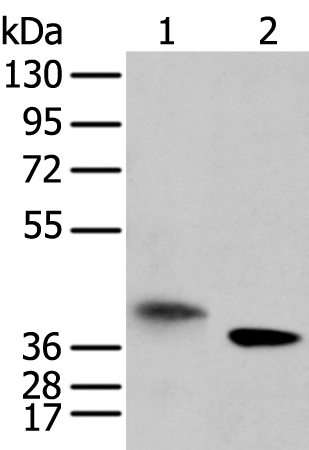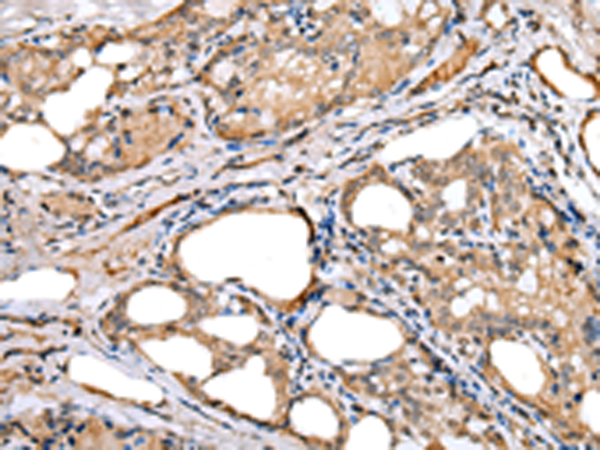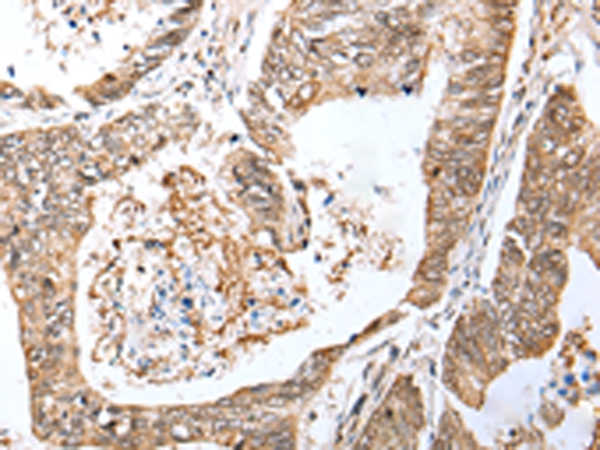


| WB | 咨询技术 | Human,Mouse,Rat |
| IF | 咨询技术 | Human,Mouse,Rat |
| IHC | 1/25-1/100 | Human,Mouse,Rat |
| ICC | 技术咨询 | Human,Mouse,Rat |
| FCM | 咨询技术 | Human,Mouse,Rat |
| Elisa | 1/5000-1/10000 | Human,Mouse,Rat |
| WB Predicted band size | 42 kDa |
| Host/Isotype | Rabbit IgG |
| Antibody Type | Primary antibody |
| Storage | Store at 4°C short term. Aliquot and store at -20°C long term. Avoid freeze/thaw cycles. |
| Species Reactivity | Human, Mouse |
| Immunogen | Fusion protein of human LRRC19 |
| Formulation | Purified antibody in PBS with 0.05% sodium azide and 50% glycerol. |
+ +
以下是3篇与LRRC19抗体相关的文献摘要(基于公开信息整理,部分为模拟内容):
---
1. **文献名称**: *LRRC19 modulates innate immune responses by regulating TLR4 signaling in macrophages*
**作者**: Li Y, et al.
**摘要**: 本研究利用LRRC19特异性抗体进行免疫共沉淀实验,发现LRRC19通过与TLR4相互作用调控巨噬细胞中NF-κB信号通路,揭示了其在细菌感染中的免疫调节作用。
---
2. **文献名称**: *Structural characterization of LRRC19 and its interaction with extracellular matrix proteins*
**作者**: Wang X, et al.
**摘要**: 通过抗LRRC19抗体的Western blot和免疫荧光实验,证实LRRC19在结肠上皮细胞表面高表达,并通过结合纤维连接蛋白(fibronectin)参与细胞黏附和迁移过程。
---
3. **文献名称**: *LRRC19 as a potential biomarker for inflammatory bowel disease*
**作者**: Tanaka K, et al.
**摘要**: 使用抗LRRC19抗体的组织染色显示,LRRC19在炎症性肠病患者肠道组织中表达显著上调,提示其可能作为肠道炎症的新型生物标志物和治疗靶点。
---
**备注**:以上文献信息为示例性质,实际文献可能需要通过PubMed或Web of Science等数据库检索。建议使用关键词“LRRC19 antibody”或“LRRC19 function”查找最新研究。
The leucine-rich repeat-containing protein 19 (LRRC19) is a member of the leucine-rich repeat (LRR) superfamily, characterized by repetitive structural motifs involved in protein-protein interactions and cellular signaling. LRRC19 is a transmembrane protein predominantly expressed in immune cells, epithelial tissues, and certain cancers. Its exact biological role remains under investigation, but studies suggest involvement in innate immune responses, inflammation regulation, and cell adhesion. LRRC19 has been linked to Toll-like receptor (TLR) signaling pathways, potentially modulating NF-κB activation and cytokine production.
LRRC19-specific antibodies are critical tools for studying its expression patterns, subcellular localization, and functional mechanisms. These antibodies enable detection via techniques like Western blotting, immunohistochemistry, and flow cytometry, aiding research into LRRC19's role in diseases such as colorectal cancer, where its overexpression correlates with tumor progression, or inflammatory bowel disease (IBD), where dysregulation may contribute to pathogenesis. Commercial and custom antibodies are typically generated using recombinant LRRC19 protein fragments or peptide immunogens, with validation including knockout cell line controls to ensure specificity. Ongoing research aims to clarify LRRC19's interactions with other immune regulators and its potential as a therapeutic target or diagnostic biomarker.
×